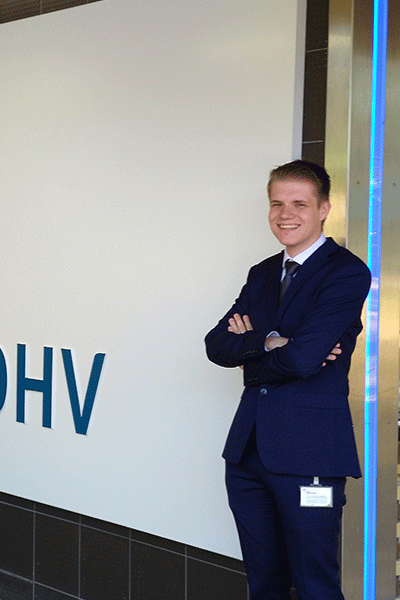“As a child, I didn’t know there was such a thing as a hydrologist, but I was already very interested in how aspects of nature interact. How are clouds and rivers or certain landscapes formed? These were questions that I asked my family from the age of three or four. I even seemed to have asked once as a four-year-old how it is possible that water comes to the shower on the second floor. I didn’t know any better than that water flows from high to low.”
“My choice of Hydrology came about quite naturally. In high school (5 Gymnasium), I had a geography teacher who happened to have done Earth Sciences. Because of this, I became aware of the Bachelor’s programme in Earth Sciences. It was exactly the Bachelor’s programme I was looking for, but which I never knew existed. Through the Bachelor’s, I ended up in the Master’s programme in Hydrology because I was most interested in the subjects that had to do with water.”
“Hans de Moel is the lecturer that has stayed with me the most. He was also my thesis supervisor and I really enjoyed the brainstorming sessions we had. I wanted to determine the fluvial flood risk for Houston (Texas) and then do a socio-economic analysis on top of this. This had never been attempted on that scale before and it was not clear in advance whether it could be done successfully. That is why we came up with a plan A, B and C for each step. In the end, the original plan succeeded and I got a nice grade out of it.”
“At Royal HaskoningDHV, we’re called on for the construction of airports and climate issues, among other things. Of course, we also have a large water department, which can then be divided into wastewater, groundwater, surface water and urban water. I work in urban water, addressing the municipality’s urban water issues on the basis of sewage models that I build. We often include surface water in our recommendations because there is usually an interaction between sewage and the surface water. In addition to providing recommendations, I have also already designed a storm sewer to solve water problems in a village in Twente.”
“I have three tips for prospective students. Make good use of the day off you have once a week during your fieldwork. There is a beer festival in Diekirch during the fieldwork. Or go by train to the city of Luxembourg for a day. During my fieldwork, that only cost two euros for a day’s return trip, but by now it should even be free! Put the fieldwork you’ve done, during both your Bachelor’s and Master’s, under relevant work experience. That’s a tip I was given while applying for a job. Finally, enjoy it most of all. It will be over before you know it.”
